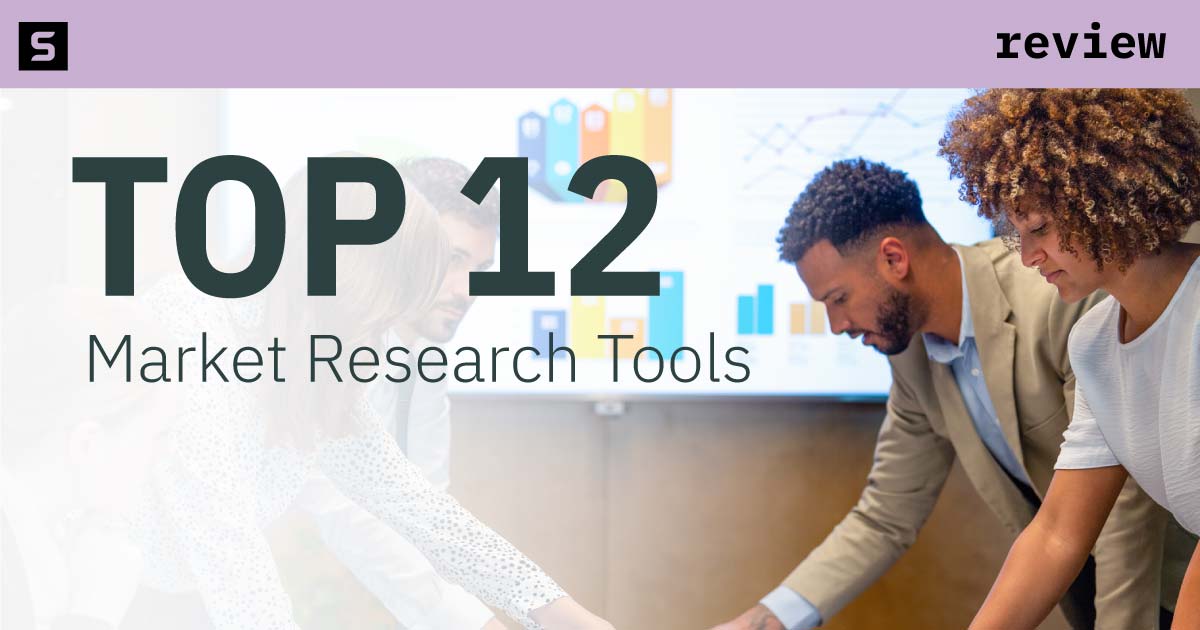12 Best Market Research Tools for Startups

Last Updated: By Michaela Dale
As a startup founder, conducting thorough market research is essential to understanding your target audience, identifying opportunities, and making informed decisions. However, with so many market research tools available, it can be challenging to know where to start.
That's why we've put together this comprehensive guide to the best market research tools for startups. Whether you're looking for competitor insights, consumer feedback, or industry data, these tools will help you gather the information you need to succeed.
Recommended: For a powerful, all-in-one market research tool, we recommend Semrush.
Top Market Research Platforms for Startups
From all-in-one platforms to specialized solutions, these market research tools offer a range of features and benefits to help you gain a competitive edge. We'll explore each tool in detail, discussing their key features, pros and cons, and pricing so you can make an informed decision about which ones are right for your startup.
Best Market Research Tool
Semrush is a powerful tool for startups with features for market research, content management, and more.
1. Semrush
Semrush is an all-in-one digital marketing platform that provides valuable insights for market research. With Semrush, you can analyze your competitors' online presence, track keyword rankings, and discover new opportunities for growth.
In addition to the platform’s robust market research capabilities, Semrush also boasts features for search engine optimization (SEO), content marketing, advertising, and social media management.
Pros
- Comprehensive competitor analysis
- Keyword research and tracking
- Site audit and backlink analysis
Cons
- Steeper learning curve for beginners
Notable Features
- Position tracking to monitor keyword rankings over time
- Organic research to uncover competitors' top pages and keywords
- Advertising research to see competitors’ ad strategies
- Brand monitoring to track online mentions
Pricing
Semrush offers three main plans: Pro ($129.95 per month), Guru ($249.95 per month), and Business ($499.95 per month). While pricier than some tools, the depth of features makes it worth the investment for serious market research.
2. Think With Google
Think With Google is a free resource provided by Google that offers consumer insights, marketing trends, and industry research. It's a great starting point for startups looking to understand their target market and stay on top of the latest marketing strategies.
Pros
- Free to use
- Insights from Google's vast dataset
- Covers a wide range of industries
Cons
- Some data may be too broad for niche startups
Notable Features
- Audience insights for understanding consumer behavior
- Marketing trends and best practices
- Case studies and success stories
- Interactive data explorers and visualizations
Pricing
Think With Google is completely free to use, making it an excellent resource for budget-conscious startups.
3. SurveyMonkey
SurveyMonkey is a popular online survey tool that allows you to gather insights directly from your target audience. With SurveyMonkey, you can create custom surveys, reach respondents around the world, and analyze results in real time.
Pros
- Easy-to-use survey builder
- Large audience reach with SurveyMonkey Audience
- Integrates with other tools like Salesforce and HubSpot
Cons
- Limited question types on basic plans
Notable Features
- Question bank with prewritten survey questions
- Skip logic and question randomization
- Data exports to Excel, PDF, and more
- Text analysis for open-ended responses
Pricing
SurveyMonkey offers four plans: Forms ($25 per user per month), Advantage ($39 per user per month), Premier ($75 per user per month), and Enterprise (custom pricing). The service also offers a 36% multi user discount.
4. Statista
Statista is a leading provider of market and consumer data, offering access to more than 1 million statistics and insights. Statistica users can find reliable data on industries, markets, and consumer behavior to make data-backed decisions for their business. The platform boasts extensive data sets from more than 190 countries as well as more than 2.5 million interviews through its consumer insights tool.
Pros
- Extensive database covering 190+ countries
- Data from trusted sources like government agencies and market research firms
- Easy-to-use interface and data visualization tools
Cons
- Some data may be too high-level for specific niches
Notable Features
- Industry reports and dossiers
- Customizable data exports and downloads
- Infographics and charts for presentations
- Forecasts and trend analyses
Pricing
Statista offers a Basic account for free, which includes limited access to data and features. Paid plans start at $199 per month for the Starter account and start at $959 per month for the Professional account.
5. Typeform
Typeform is a user-friendly survey and form builder that allows you to create engaging, conversational surveys. With its sleek design and interactive features, Typeform can help you gather insights on everything from signups to feedback while providing a great user experience for your respondents.
Pros
- Intuitive, user-friendly interface
- Customizable design and branding options
- Integrates with popular tools like Google Sheets and Mailchimp
Cons
- One user only for the Basic plan
Notable Features
- Logic jumps and question branching
- Hidden fields for personalization and tracking
- Custom thank-you screens and follow-up emails
- Built-in photo and video questions
Pricing
Typeform offers four plans: Basic ($25 per month), Plus ($50 per month), Business ($83 per month), and Enterprise (custom pricing), which reflect discounts for annual billing.
6. Glimpse
Glimpse is an artificial intelligence (AI)-powered market research platform that helps businesses uncover actionable insights from customer feedback and online conversations. By analyzing data from sources like reviews, social media, and forums, Glimpse can help you understand customer sentiment, identify trends, and make data-driven decisions.
Pros
- Automated data collection and analysis
- Insights from a wide range of online sources
- Customizable dashboards and reports
Cons
- Higher cost than some competitors
Notable Features
- Sentiment analysis to understand customer emotions
- Topic modeling to identify key themes and trends
- Competitor benchmarking and analysis
- Integration with tools like Slack and Zapier
Pricing
Glimpse offers a pay-as-you-go plan, a Professional plan ($500 per month), an Advanced ($1,000 per month), and an Enterprise plan (custom pricing) with a $50 credit sign-up bonus included. It also offers discounts for annual billing.
7. US Census Bureau
The US Census Bureau is a government agency that provides a wealth of demographic and economic data. While not specifically designed for market research, the data available through the US Census Bureau can be incredibly valuable for startups looking to understand their target market and industry.
Pros
- Free, reliable data from a trusted source
- Wide range of demographic and economic variables
- Geographic data down to the local level
Cons
- Data may be too broad for some market research needs
Notable Features
- American Community Survey for detailed population and housing data
- Economic Census for comprehensive business data
- Census Business Builder for easy access to key data points
- Interactive data tools and visualizations
Pricing
All data from the US Census Bureau is free and publicly available.
8. AnswerThePublic
AnswerThePublic is a keyword research tool that helps you understand what people are searching for online. By generating visualizations of related questions and phrases submitted through search engines like Google, AnswerThePublic can help you identify content opportunities and gain insights into your target audience's needs and interests.
Pros
- Online course and ebook included in all plans
- Unique data visualization format
- Covers a wide range of topics and industries
Cons
- Limited to keyword-based insights
Notable Features
- Question and preposition wheels for related queries
- Alphabetical and popularity-based lists of keywords
- Data export options for further analysis
- Comparison reports for tracking changes over time
Pricing
AnswerThePublic offers three plans: Individual ($9 per month), Pro ($99 per month), and Expert ($199 per month). The platform also offers a 90% off lifetime option that charges a one-time fee for lifetime access to the platform.
9. BrandMentions
BrandMentions is a social media monitoring and analytics tool that helps businesses track their online presence and reputation. By monitoring mentions of your brand, competitors, and industry keywords across social media, news sites, and blogs, BrandMentions can help you stay on top of trends and gain valuable insights.
Pros
- Comprehensive coverage of online sources
- Real-time alerts and notifications
- Sentiment analysis and influencer identification
Cons
- Some data sources may require additional setup
Notable Features
- Customizable dashboards and reports
- Historical data analysis and trend tracking
- Insights on customers’ core interests
- Social media tracker tools for your business and competitors
Pricing
BrandMentions offers three plans: Growing Business ($79 per month), Company ($249 per month), and Enterprise/Agency ($399 per month).
10. PickFu
PickFu is a consumer research platform that allows you to get fast, reliable feedback on product ideas, designs, and marketing copy. By presenting your concepts to a targeted audience and asking them to choose between options, PickFu can help you make data-driven decisions and optimize your offerings.
Pros
- Quick, easy way to get consumer feedback through polls
- Targeted audiences based on demographics and interests
- Helpful for testing product ideas and designs
Cons
- Free plan still requires users to pay per poll response
Notable Features
- Customizable polls with images, text, and videos
- Real-time results and analytics
- Demographic filters and insights
- Shareable reports and embeddable widgets
Pricing
PickFu offers three plans: Free Forever ($0 per month + $1 per poll response), Professional ($79 per month + $0.95 per poll response), and Team ($299 per month + $0.90 per poll response).
11. Attest
Attest is a consumer insights platform that helps businesses gather real-time feedback from their target audience. With Attest, you can create surveys, run experiments, and track brand performance to make informed decisions and drive growth. The platform offers an all-in-one customer research tool, providing features for gathering, analyzing, and leveraging data to grow your business.
Pros
- Access to a large, diverse consumer panel
- Intuitive survey builder and targeting options
- Automated analysis and reporting
Cons
- No pricing information included on the website
Notable Features
- Brand tracking and benchmarking
- Expert-written survey templates with preset audiences
- Audience profiling and segmentation
- Integration with popular tools like Slack and Zapier
Pricing
Attest doesn’t disclose pricing information on its website so you must reach out to the company directly to obtain a quote.
12. quantilope
quantilope is an end-to-end customer insight automation platform powered by AI that helps businesses conduct market research and gather consumer insights at scale. With quantilope, you can create complex surveys, analyze results, and generate reports — all within a single, user-friendly platform. Plus, with its powerful tech-driven features, the entire consumer research experience is complete in just one to five days.
Pros
- Intuitive, drag-and-drop survey builder
- Automated data analysis and reporting
- Supports advanced research methods like conjoint analysis
Cons
- Higher learning curve compared to simpler survey tools
Notable Features
- Customizable dashboard and data visualizations
- Multilingual surveys and translations
- Quota management and sample balancing
- Integration with popular tools like Salesforce and Tableau
Pricing
quantilope offers custom pricing based on your specific research needs and volume. Contact its sales team for a personalized quote and demo.
FAQs
Which market research tool is best for a tight budget?
For startups on a tight budget, Think With Google, the US Census Bureau, and AnswerthePublic offer valuable insights at no cost. SurveyMonkey and Typeform also have free plans that can be useful for basic surveys and customer feedback.
How do I choose the right market research tool for my startup?
When choosing a market research tool, consider your specific needs and goals. Think about the type of data you need (e.g., competitor insights, consumer feedback, industry trends), the size and scope of your research, and your available budget and resources. It can also be helpful to take advantage of free trials or demos to get a feel for each tool before committing.
Can I use multiple market research tools together?
Yes, using multiple market research tools can give you a more comprehensive understanding of your market and customers. For example, you might use Semrush for competitor analysis, SurveyMonkey for customer feedback, and Statista for industry data. Just be sure to have a clear plan for how you'll integrate and analyze data from different sources.


